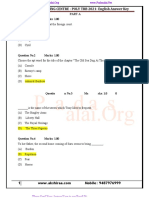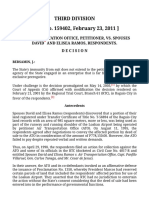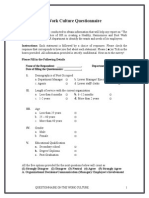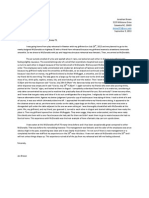DATA ANALYST INTERVIEW
✅ Communication and English Fluency
Q1: Tell me about yourself.
I am from Khulna. I'm a recent graduate in Electronics and Communication Engineering from
Khulna University in February, 2025. During my studies, I developed a strong interest in data and
analytics, which led me to pursue a three-month internship at CodeAlpha Technologies as a Data
Analyst Intern. There, I worked with real datasets, performed data cleaning and analysis using
Python and SQL, and visualized insights using Power BI and Excel. I’ve also completed several
academic and personal projects that deepened my skills in handling data and solving problems
analytically. I'm now looking to start my professional journey as a data analyst, and I’m excited
about the opportunity to contribute to a data-driven company where I can apply my skills and
grow as part of a global team.
Q: What are your biggest strengths and weakness?
✅ Strengths:
One of my biggest strengths is my analytical mindset. I enjoy breaking down complex problems
and finding patterns in data. During my internship, I was appreciated for how I structured my
analysis and presented clear insights. I’m also a quick learner—I picked up tools like Power BI
and advanced Excel functions on my own while working on projects. Additionally, I’m a good
communicator, which helps me explain technical findings to non-technical people clearly.
Weakness:
"Earlier, I used to focus too much on getting every detail perfect before moving on. While it
helped ensure accuracy, it sometimes slowed me down. I’ve learned to balance perfection with
efficiency by setting internal deadlines and prioritizing tasks. I still care about quality, but now I
focus more on delivering results within timeframes."
Q2: How do you explain complex technical findings to a non-technical stakeholder?
I focus on simplifying the message by removing technical terms and using visuals. For example,
instead of saying "we observed a statistically significant correlation," I might say, "we found a
strong relationship between marketing spend and sales." Tools like Power BI and Excel charts
help me tell the story visually so stakeholders can grasp the key insights quickly.
Q3: Describe a time when you faced a data-related challenge. How did you solve it?
During my internship, I worked with a sales dataset that had a lot of missing and inconsistent
entries. First, I used Python’s pandas library to identify patterns in the missing data. I decided to
use mean imputation for numerical values and mode imputation for categorical ones. Then, I
validated the cleaned dataset through visualizations and summary statistics to ensure accuracy
before analysis.
�Q4: How do you approach a new data analysis project?
I follow a structured process: 1. Understand the business objective, Explore the dataset (EDA),
Clean and preprocess data, Analyze patterns and trends, Visualize key findings, Present insights
clearly and make recommendations. Throughout, I ask clarifying questions and document my
steps for transparency.
Work Experience and Project Understanding
Q5: Can you describe one of your data analysis projects?
One of my key projects involved analyzing customer churn data. I used Python to clean and
preprocess the dataset, then applied statistical methods to identify key churn drivers. I visualized
the results in Power BI dashboards, highlighting trends like service dissatisfaction and contract
type. This project helped me understand how data can provide actionable business insights.
Q6: What did you learn during your internship at CodeAlpha Technologies?
I learned how to work with real-world, messy data and apply tools like SQL and Excel for data
wrangling and reporting. I also gained experience collaborating with team members remotely,
documenting my work clearly, and presenting results during weekly meetings. It reinforced my
ability to handle end-to-end analysis workflows.
Professionalism and Cultural Fit
Q7: How do you handle feedback, especially when working in a team?
I see feedback as an opportunity to grow. During my internship, I regularly received suggestions
from my mentor, and I always took time to understand and implement them. I also asked for
feedback proactively to improve my work quality and align with team expectations.
Q8: What does professionalism mean to you in a global remote team?
To me, professionalism means being reliable, respectful, and proactive. In a global team, it’s also
about being mindful of time zones, communicating clearly, documenting progress, and being
culturally sensitive. I always aim to meet deadlines, stay accountable, and communicate early if
issues arise.
Q9: How good are you at handling pressure?
I believe I handle pressure quite well. In fact, I see pressure as a natural part of growth and
learning. During my internship at CodeAlpha Technologies, I often had to meet tight deadlines
while analyzing large datasets and preparing reports. I stayed calm by breaking the tasks into
smaller steps and prioritizing the most critical ones. I also kept clear communication with my
mentor and team, which helped manage expectations and avoid last-minute surprises. I’ve learned
that staying organized, focused, and asking for help when needed are key to performing well under
pressure.
�Q10: What are you see yourself after five years?
In five years, I see myself as a skilled and experienced data analyst, working on impactful projects
that help drive strategic decisions for a company. I want to continue improving my technical
skills—possibly learning more about machine learning, advanced analytics, and cloud tools like
Azure or AWS. I also hope to grow into a position where I can mentor junior analysts and
contribute to building a strong data-driven culture within the organization. If given the
opportunity, I’d love to grow within a company like Airwork.ai that values innovation, global
collaboration, and continuous learning.





















































































